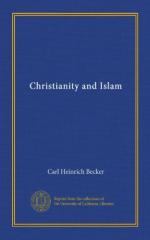When a man’s profession or position prevented him from practising these mystical exercises, he satisfied his religious needs by venerating persons who were nearer to the deity and whose intercession was effectual even after their death and sometimes not until they were dead: hence arose the veneration of saints, a practice as alien as pantheistic dogma to primitive Islam. The adoption of Christian saint worship was not possible until the person of Muhammed himself had been exalted above the ordinary level of humanity. Early Muhammedans observed that the founder of Christianity was regarded by popular opinion as a miracle worker of unrivalled power: it was impossible for the founder of Islam to remain inferior in this respect. Thus the early biographies of the prophet, which appeared in the first century of Muhammedanism, recount the typical miracles of the Gospels, the feeding of multitudes, healing the sick, raising the dead and so forth. Two methods of adoption may be distinguished. Special features are directly borrowed, or the line of advance is followed which had introduced the worship of saints and relics to Christianity a short time before. The religious emotions natural to any people produced a series of ideas which pass from one religion to another. Outward form and purport may be changed, but the essential points remain unaltered and are the living expression of that relation to God in which a people conceives itself to stand. Higher forms of religion—a fact as sad as it is true—require a certain degree not only of moral but of intellectual capacity.
Thus we have traversed practically the whole circle of religious life and have everywhere found Islam following in the path of Christian thought. One department remains to be examined, which might be expected to offer but scanty opportunity for borrowings of this kind; this is dogma. Here, if anywhere, the contrast between the two religions should be obvious. The initial divergencies were so pronounced, that any adoption of Christian ideas would seem impossible. Yet in those centuries, Christianity was chiefly agitated by dogmatic questions, which occupied men’s minds as greatly as social problems at the present day. Here we can observe most distinctly, how the problems at least were taken over by Islam.
Muhammedan dogmatic theology is concerned only with three main questions, the problem of free-will, the being and attributes of God, and the eternal uncreated nature of God’s word. The mere mention of these problems will recall the great dogmatic struggles of early Christianity. At no time have the problems of free-will and the nature of God, been subjects of fiercer dispute than during the Christological and subsequent discussions. Upholders of freedom or of determinism could alike find much to support their theories in the Qoran: Muhammed was no dogmatist and for him the ideas of man’s responsibility and of God’s almighty and universal power were




